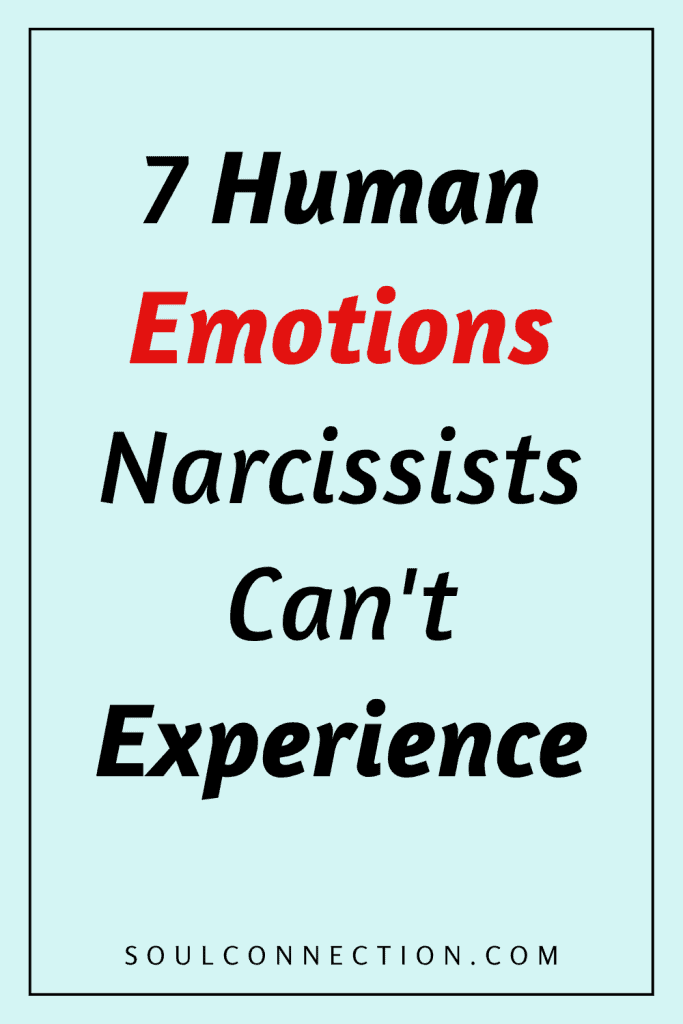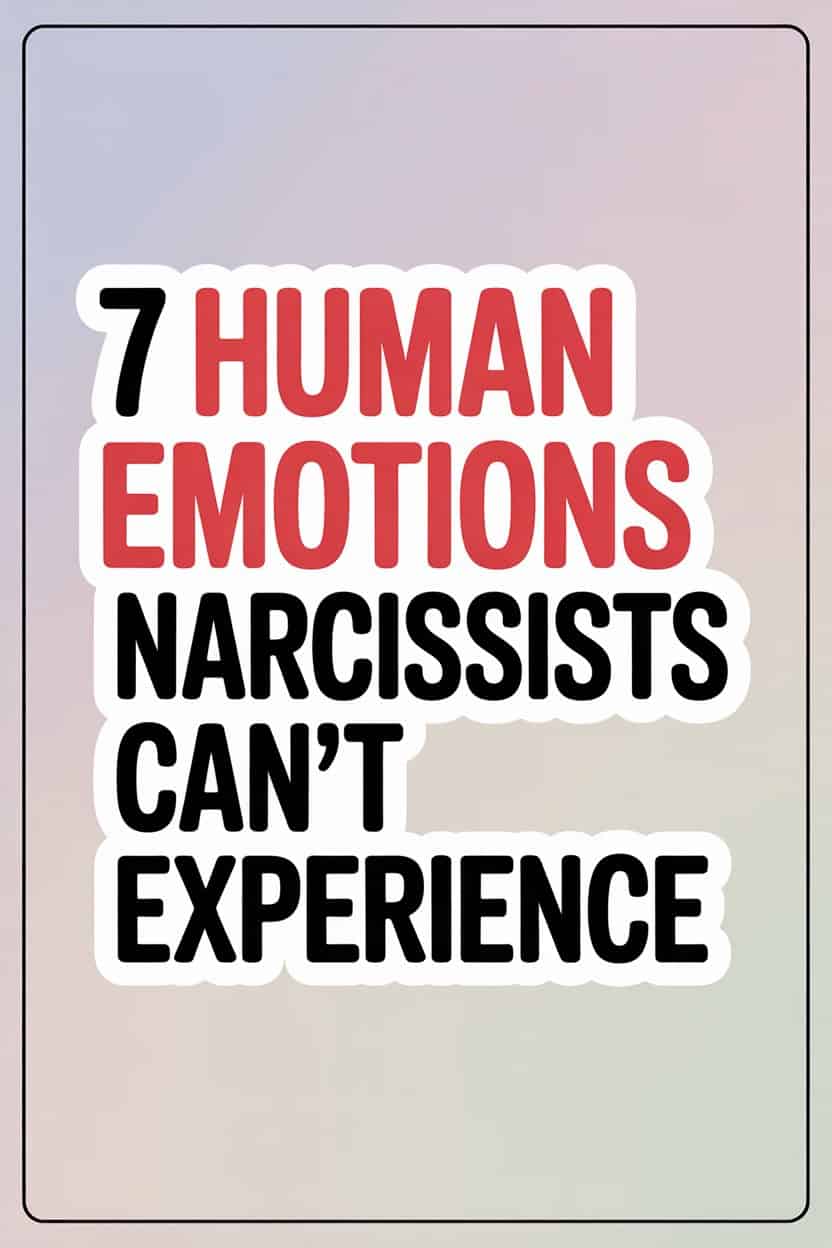Dating someone with a sprinkle (or, let’s face it, a tsunami) of narcissism? If so, you probably know that the emotional weather in their world is always sunny for them and a perpetual tornado for anyone else.
Narcissists tend to stumble through life with a unique set of emotional blind spots—ones that leave the rest of us wondering if they’re part robot, or simply allergic to feelings the way some people are allergic to gluten.
Ready for a reality check? Here’s a breakdown of seven emotions that narcissists just can’t seem to access—no matter how hard you wish they would.
1. Genuine Empathy
Empathy is like WiFi for human connection: when it’s strong, everyone feels plugged in. When it’s weak or missing, good luck streaming any emotional intimacy.
For narcissists, empathy signals are often more “dropped call” than “full bars.”
Instead of tuning in to your sadness or excitement, narcissists tend to squint at your feelings the way a cat stares at a cucumber—confused, slightly alarmed, and totally detached.
They might mimic empathy in a “monkey-see, monkey-do” kind of way (think, “I’m sorry you feel that way”), but it’s usually just emotional copy-paste, not genuine understanding.
If you find yourself explaining why something hurt you and getting a blank stare—or worse, an eye roll—it’s not you being needy. It’s them being… well, them.
Expecting a narcissist to actually feel what you’re feeling is like waiting for your smartphone to cook dinner. Not going to happen.
2. True Remorse
Everybody messes up. Most of us feel a gut punch of regret, mumble a heartfelt “sorry,” and then do our best not to repeat the performance.
Narcissists? Apologies from them are about as sincere as a politician’s campaign promise.
True remorse is the uncomfortable recognition that your actions hurt someone else. For narcissists, the only regret is being caught, inconvenienced, or temporarily losing their fan club.
Their “apologies” are often just strategic pauses in their regularly scheduled self-adoration—quick, performative, and designed to get you off their back.
If you ever hear, “I’m sorry you got upset,” just know that’s not remorse; it’s them sidestepping actual accountability.
Expecting change after an apology from a narcissist is like expecting your cat to obey the law of gravity—it’s going to do whatever it wants, regardless.
3. Genuine Gratitude
Gratitude is the warm, fuzzy feeling that comes from recognizing others’ kindness. In the world of narcissists, gratitude is about as common as snow in the Sahara.
If you’re waiting for a narcissist to thank you sincerely, buckle up—this could take a while.
Every good deed you do is not a favor, but an obligation in their eyes. Cooked their favorite meal? Well, that’s what you’re supposed to do! Picked them up from the airport at 2 a.m.? Naturally, you should be honored.
Any “thank you” is likely to be transactional, if it appears at all. Narcissists expect the world to orbit around their needs, so the idea of feeling grateful is as alien as, say, reading a book about humility.
4. Authentic Vulnerability
Opening up emotionally requires a kind of bravery that narcissists can’t quite muster. True vulnerability means admitting flaws, sharing doubts, and letting someone else see the messy, unfiltered version of you.
Narcissists, on the other hand, treat their image like a Fabergé egg—delicate, precious, and always on display.
Their version of vulnerability tends to involve crocodile tears, dramatic stories that paint them as the world’s greatest victim, or confessions that are carefully curated to win sympathy and admiration.
Anything that risks exposing genuine weakness gets buried deeper than your childhood diary.
If you’ve ever tried to have a real, heart-to-heart conversation with a narcissist, you probably walked away feeling like you just talked to a cardboard cutout. Vulnerability isn’t just missing—it’s actively avoided.
5. Selfless Love
Unconditional, selfless love is the stuff epic romances are made of. It’s also the one ingredient narcissists can’t find at the emotional supermarket.
Their “love” is usually best described as intense interest in their own reflection—with other people serving as backup dancers.
Narcissists might shower you with affection (at first), but it’s usually a means to an end. The moment your needs eclipse theirs, you may as well be invisible. Their relationships run on admiration and attention, not genuine care or sacrifice.
Ever notice how your struggles are ignored, but theirs become the topic of conversation for days? That’s because narcissists see relationships as opportunities for personal gain, not shared growth.
6. Lasting Guilt
Guilt is that nagging feeling that prods most of us to do better. For narcissists, guilt is like a guest who never gets an invitation—it just doesn’t show up. Their default setting is self-preservation, not self-reflection.
When called out for bad behavior, narcissists tend to double down, deflect, or blame-shift faster than a toddler with marker stains on their hands.
“It’s not my fault” could be their family crest. And if they do appear guilty, there’s usually an ulterior motive: manipulation, reputation management, or just making you drop the subject.
Don’t wait for an “I shouldn’t have done that” moment from a narcissist. You’ll grow old first.
7. Sincere Admiration for Others
Giving credit where credit is due? Not in the narcissist’s playbook. Sincere admiration for others is tough when your permanent address is Center of the Universe.
Narcissists struggle to honestly celebrate someone else’s achievements. Compliments come with strings, or as a tactical move—never out of actual appreciation.
If someone else gets the spotlight, expect some creative undermining, one-upmanship, or “humblebrag” jujitsu.
Trying to share your successes with a narcissist can feel like bringing a balloon to a porcupine party: pop, there goes your moment. If you want cheerleaders, look elsewhere.
What Can You Do About It?
Learning that narcissists can’t experience (or even fake) these basic human emotions can be disheartening—especially if you’ve spent time hoping they’d change.
Here’s the good news: this isn’t about you being “too sensitive,” “demanding,” or “ungrateful.” It’s about fundamental wiring.
Look for validation and emotional support from people who actually have the emotional range of a functioning adult. Set boundaries like your sanity depends on it (because, honestly, it does).
Practice the messy art of self-care: talk to friends, seek therapy, and remember that you’re not alone or unreasonable for wanting real connection.
And if you’re still in a relationship with a narcissist, here’s your gentle nudge: it’s okay to expect more. The world is full of people who can feel with you and for you.
Don’t settle for less just because someone else’s emotional WiFi is permanently down.
Time to find your people—and leave the robots to their own devices.


